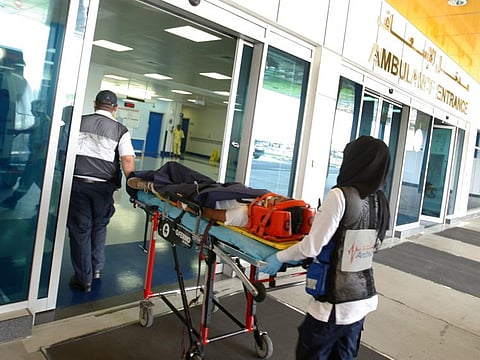Make immediate patient care mandatory in the UAE
No hospital rule more important than a patient’s life

The Abu Dhabi health regulator’s instructions to all health care facilities to offer immediate treatment to patients in an emergency case regardless of their insurance status and validity, or face the full brunt of the law, is a timely reminder to health care providers of their primary responsibility.
The directive addresses an issue that often has stymied the effectiveness of the health care system and been a source of anguish for people. When hospitals deal with emergency cases, there must follow a protocol that is different to, and which supersedes, the usual protocol of patient admittance and insurance checks.
No hospital must be allowed to discharge a patient on referral to another facility without all the arrangements being made, including keeping insurance issues on hold due to the critical circumstances. In the absence of such preparedness, the outcome can be fatal as was proved in the case of the death of two-year-old boy from Al AinGulf News
Providing immediate treatment to the patient and stabilising their condition needs to be a mandatory, unconditional response of health care providers and the directive from the Department of Health underlines this clearly.
The directive also focuses on another important factor whose significance cannot be overemphasised — coordination between facilities for patient transfer in critical cases.
No hospital must be allowed to discharge a patient on referral to another facility without all the arrangements being made, including keeping insurance issues on hold due to the critical circumstances. In the absence of such preparedness, the outcome can be fatal as was proved in the case of the death of two-year-old boy from Al Ain.
Reneging on their responsibility
The plight of the boy’s father who had to rush with his critically ill child to the referral private facility on his own, be refused admittance due to insurance matters and rush again to a public health care provider, while precious time drained away, irreparably damaging his son’s health, is a stark pointer to health care sector on how they reneged on their responsibility.
The effectiveness of a health care system is dependent on many factors with the most important being their response to an emergency case. The patient’s life depends on the hospital’s response timing and the sooner a hospital gets its act together and eschews the administrative runaround, the better is the outcome for all.
In the complex inter-connectedness of modern health care systems, hospitals and insurance companies have become inevitable business partners, and the patient, who is the consumer, is at times rendered entirely vulnerable to their systems and rules.
But no rule or process can be more important than a patient’s life. Such measures by the authorities empower consumers to avail of what is due them and act as a reminder to health care providers of what their essential role in society is.



